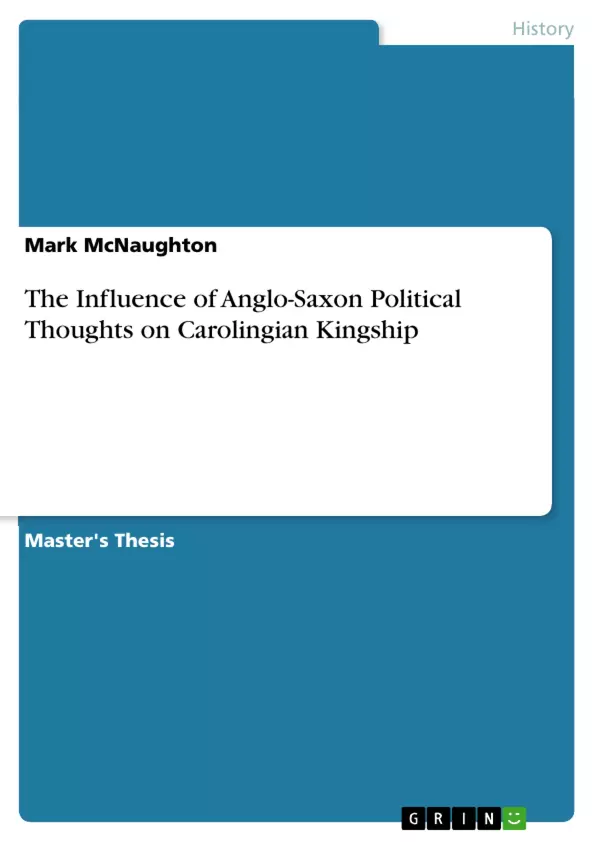The geographical area we now call England produced four great political thinkers in the eighth century, the Venerable Bede, Boniface, Cathwulf and Alcuin of York. The first of these was a monk who lived in the monastery at Jarrow in the Anglo-Saxon kingdom of Northumbria, while the latter three were clerics who were more at home in the palaces and at the courts of Continental monarchs. All lived in a society that was governed by kings and united under Roman Christianity. Their careers as churchmen gave them the opportunity to write down ideas on monarchical government: the rule of kings. Each had a different background in the church, yet all had an impact upon the kingship of the Frankish dynasty, the Carolingians, by engaging with the contemporary political issues of their day. The surviving works to be focused upon here are Bede’s Historia Ecclesiastica Gentis Anglorum and his Letter to Egbert; Boniface’s correspondence ; Cathwulf’s letter to Charlemagne, king of the Franks ; Alcuin’s Versus de Patribus Regibus et Sanctis Euboricensis Ecclesiae and his correspondence. Within these extant works can be found a fairly sophisticated theory of kingship that was in essence Anglo-Saxon but which had evolved in the works of each writer to meet the needs of their own situation. The ideology they articulated in their writings needs to be explored in detail, as does the evidence of the transmission of the HE across the English Channel, for as a book the HE would have had a markedly wider audience than the epistolary evidence and with the exception of the Letter to Egbert it is the only text that was definitely not written on the Continent. Moreover, how these ideas affected the practical and theoretical basis of Carolingian kingship in the eighth and the ninth centuries needs to be examined; ideas that were inherently Insular because of their biblical tone.
Inhaltsverzeichnis (Table of Contents)
- Introduction
- Bede on Kingship
- Transmission of Texts to the Continent
- The HE and Kingship
- Bede's Letter to Egbert
- Boniface and the Missionaries on the Continent
- Alcuin of York
- Cathwulf
Zielsetzung und Themenschwerpunkte (Objectives and Key Themes)
This work explores the ideas of kingship developed by four key eighth-century English thinkers: Bede, Boniface, Cathwulf, and Alcuin. It examines their works, particularly focusing on Bede's Ecclesiastical History of the English People (HE) and its impact on continental European monarchs, especially the Carolingian dynasty.
- The development of Anglo-Saxon ideas of kingship
- The influence of Anglo-Saxon political thought on the Carolingian dynasty
- The role of the HE as a text of kingly advice and political theory
- The transmission of Anglo-Saxon cultural texts to the Continent
- The practical and theoretical implications of Anglo-Saxon political ideas for Carolingian kingship
Zusammenfassung der Kapitel (Chapter Summaries)
- Introduction: This chapter introduces the four English political thinkers - Bede, Boniface, Cathwulf, and Alcuin - and their contributions to the development of ideas about kingship in the eighth century. It highlights the significance of their works, especially Bede's HE, in shaping political thought in England and on the Continent.
- Bede on Kingship: This chapter delves into Bede's ideas about kingship as expressed in the HE and his Letter to Egbert. It analyzes how Bede's writings provide a theological framework for kingship, emphasizing the role of Christian principles in ruling.
- Transmission of Texts to the Continent: This chapter examines the various mechanisms and actors involved in the transfer of Anglo-Saxon cultural texts, including the HE, to the Continent. It highlights the role of merchants, missionaries, refugees, and envoys in facilitating this cultural exchange.
- The HE and Kingship: This chapter analyzes the impact of Bede's HE on political thought and practice in the Frankish kingdom. It explores how the HE served as a handbook for both ecclesiastics and kings, providing guidance on evangelization, Christian rule, and the successful governance of a Christian kingdom.
- Bede's Letter to Egbert: This chapter focuses specifically on Bede's Letter to Egbert, examining its content and significance in understanding Bede's views on kingship and its relationship to the church.
- Boniface and the Missionaries on the Continent: This chapter explores the political ideas expressed in the correspondence of Boniface and other missionaries. It examines how their writings influenced political thought and practice in the Frankish kingdom, particularly in relation to the Carolingian dynasty.
- Alcuin of York: This chapter focuses on the political ideas of Alcuin, a key figure in the Carolingian Renaissance. It analyzes his works, particularly his York Poem and correspondence, for evidence of Anglo-Saxon political thought and its influence on Carolingian kingship.
- Cathwulf: This chapter examines Cathwulf's letter to Charlemagne, discussing its content and significance in understanding Anglo-Saxon political ideas and their reception in the Frankish court.
Schlüsselwörter (Keywords)
Anglo-Saxon kingship, Carolingian dynasty, Bede, HE, Boniface, Cathwulf, Alcuin, political thought, religious influence, cultural transmission, missionary activity, Frankish kingdom, Carolingian Renaissance, Insular, biblical tone.
Frequently Asked Questions
Who were the four key Anglo-Saxon political thinkers?
The thinkers were the Venerable Bede, Boniface, Cathwulf, and Alcuin of York.
How did Bede's "Historia Ecclesiastica" (HE) influence kingship?
The HE served as a handbook for kings, providing a theological framework for Christian rule and guidance on successful governance.
What was the impact of Anglo-Saxon thought on the Carolingian dynasty?
Anglo-Saxon clerics at the Frankish courts introduced sophisticated theories of kingship with a strong biblical tone that shaped Carolingian political practice.
How were Anglo-Saxon texts transmitted to the Continent?
Transmission occurred through missionaries, merchants, refugees, and envoys who carried books across the English Channel.
What is significant about Alcuin of York's role?
Alcuin was a key figure in the Carolingian Renaissance, advising Charlemagne and using Anglo-Saxon political ideas to influence Frankish kingship.
- Quote paper
- Mark McNaughton (Author), 2001, The Influence of Anglo-Saxon Political Thoughts on Carolingian Kingship, Munich, GRIN Verlag, https://www.hausarbeiten.de/document/438376


